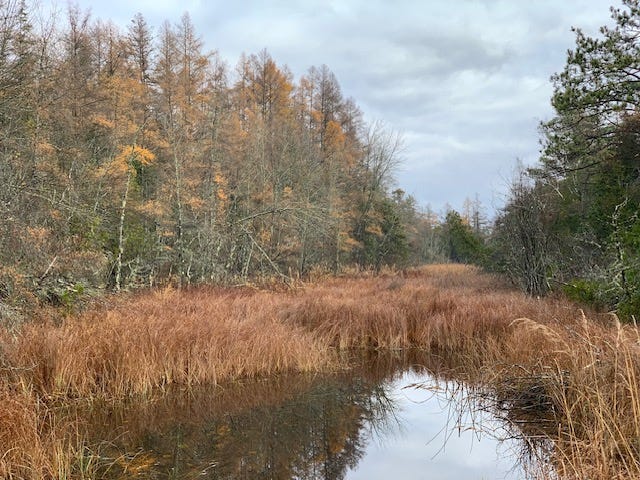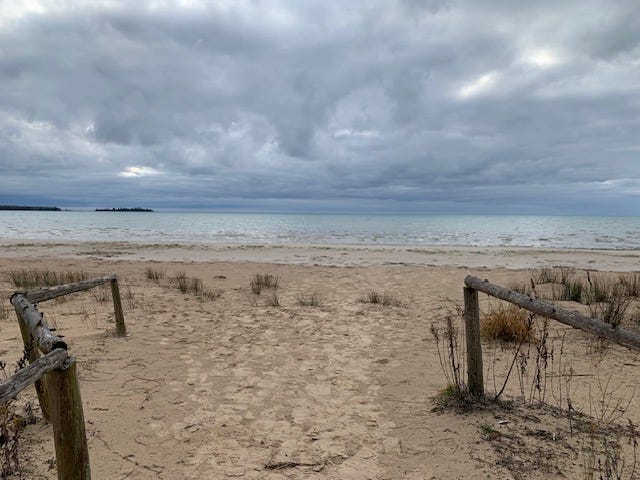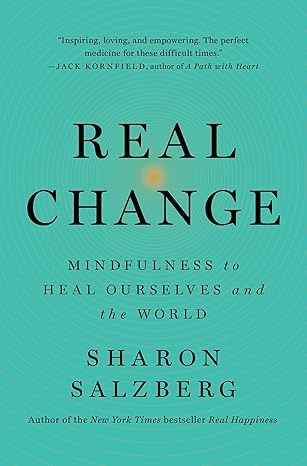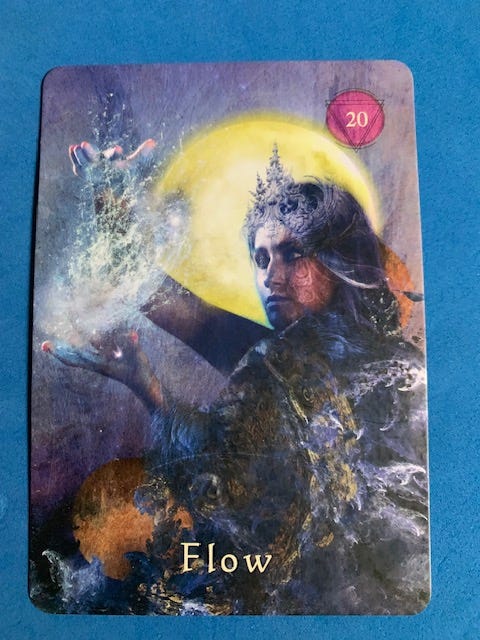Hope Is An Action to Take Into 2025
Insight from a powerful read on social justice, mindfulness, and Buddhist thought.
Every fall for the last many years, I’ve spent a long weekend in Door County, Wisconsin, on retreat with one of my yoga teachers. The agenda is almost exactly the same each time.
The thing that has made this retreat a thing I look forward to is, of course, the yoga and being in community. But it’s also the way the schedule has plenty of space in it to simply wander, to write or read, to enjoy a coffee or meal, whatever it is you need to fill your own cup. This weekend has been the time I’ve visited local places I want to return to after a year away, as well as time I tend to chew over the messages that I’ve been tuning into and finally have the quiet solitude to truly be with.
It has been a monstrously horrific year in my life. I have not been public with the bulk of it for reasons that most of it is not mine to tell. My teacher at the retreat knew nearly all of it and told me during our Sunday morning one-on-one conversation that he was shocked I made it at all. He’d wondered if everything going on would require my presence, and on top of that, I lost my beloved cat of 18 years just days prior. I told my teacher that the night before the treat, I’d asked my husband if it was the right decision to still go. My heart said yes, but my head was not sure.
We agreed that I needed to go.
When I got to town, I made a list of everything I wanted to do and see. Would I achieve it? Maybe. I kept wondering why I needed a checklist here, in this moment, and realized it was my anxiety demanding some sense of control. Acknowledging that early on and honoring it made the difference between feeling like I didn’t do all I wanted to and what really happened: getting more out of the entire experience than ever imagined.
During the free time we had on Saturday, I wandered into kindgoods. I wandered, picking up a couple of stickers for my laptop and water bottle, and then kept coming back to a book in their small selection of titles. It was Real Change: Mindfulness to Heal Ourselves and The World by Sharon Salzberg.
I took the book back with me to the spa where the retreat was held, and I found myself quickly blowing through and marking passage after passage. It was resonating deeply with my need to build a sense of control–and my need to remember that any and all action must be countered with some sort of counteraction in order to refill my own cup. These things are not in opposition.
Salzberg’s book published in September 2020. She talks in several places about COVID upending “normalcy” in so many of our lives, and she emphasizes again and again that we have an incredible capacity to enact change on both the individual and, crucially, the systemic level. It was through COVID she was able to better articulate and see this, as well as share those lessons and insights with others.
The book could not be more relevant now.
My retreat brought up a lot of things and it provided the kind of true rest my body, mind, and soul needed. It was a break from the routine and the news, but it was also an opportunity to be reminded that whatever our spiritual beliefs may be, they guide us to impact change. Salzberg’s book brought up several interesting parallels to the experiences I had in the moments reading the book, as well as in the meaningful conversations I had that weekend with my teacher, with fellow retreat attendees, and with the world around me as I ventured out on a few walks through nature. One of the biggest was the idea of how tremendous water is. How, like water, we can and do take different shapes to meet the space we’re in–ice freezes when it is cold, becomes condensation when it is hot, and moves through the world, sometimes going around but always, always chipping away at the obstacles in its way.
The oracle card I’d picked out on Friday night and left tucked under my yoga mat until Sunday morning when I could have a one-on-one with my teacher was eerily in tune with this, too.
Even when water looks stagnant, it isn’t. It is ever in the process of flow.
To wrap up a trying and downright miserable year, I wanted to offer some of the most profound passages and insights from Real Change. I couldn’t get enough of it, and I hope that it inspires you to sit, to feel, to think, and to build your habit of hope as we come into a whole new calendar. You’ll find some quotes pulled out here, alongside some questions to consider.
Acceptance doesn't mean succumbing to what's going on. When we succumb to a situation, we collapse into it, or become immersed in it or possessed by it. While trying to cross the flood, instead of moving we linger and we drown, we get possessed by the waves of the flood, we are overcome by them. Yet acceptance clearly doesn't mean we struggle against the waves. Trying to push against the waves or push them out of the way exhausts us and is futile. We have to use the momentum of each wave on the crossing to help us go along. But it takes a special kind of strength to be able to be this delicate, to be able to be in the middle of the flood, not sinking and not thrashing around.
The crossing of the flood is only accomplished one moment at a time. The art of this accomplishment is the ability to continually begin again. This is the other side of letting go, the doorway letting go reveals. We set forth, we struggle or get muddled or anxious, we lose our balance, and then realizing it, we begin again. We don't need self-recriminations or blame or anger. We need a reawakening of intention and a willingness to recommit, to be wholehearted once again.
What kind of world do you most believe in?
Sometimes we find ourselves confronting a seemingly intractable problem. We’re overwhelmed and don’t know what to do to make it all okay…until, after a time, we realize we need to do the one small thing that’s in front of us, or nothing will ever change. We sit and remember we are worth something—that all of us are—and we use that realization to give us courage and determination.
How and where can you honor anger without letting it burn you up?
To grieve, whether for a person, a set of ideals, or our hopes and dreams, is to watch reality, once so solid-seeming, become molten. It’s hard to get oneself to take the next step in a dissolving world—where will our foot land when it seems nothing will support us? How do we move toward inner or outer change?
To start with, here are some footholds for our next step, thanks to two insightful writers.
“Grief expressed out loud for someone we have lost, or a country or home we have lost, is in itself the greatest praise we could ever give them,” says writer Martín Prechtel. “Grief is praise, because it is the natural way love honors what it misses.” Seeing grief in this way helps us respect what we are going through, rather than being mired in shame and discouragement on top of the pain we already feel.
What happens if we recognize the love inside of grief? Journalist Dahr Jamail writes about his grief for the planet on Truthout, a nonprofit news website:
“Each time another scientific study is released showing yet another acceleration of the loss of ice atop the Arctic Ocean, or sea-level-rise projections are stepped up yet again, or news that another species has gone extinct is announced, my heart breaks for what we have done and are doing to the planet. . . .
Grieving for what is happening to the planet also now brings me gratitude for the smallest, most mundane things. Grief is also a way to honor what we are losing. . . . My acceptance of our probable decline opens into a more intimate and heartfelt union with life itself. The price of this opening is the repeated embracing of my own grief. . . . I am grieving and yet I have never felt more alive. I have found that it’s possible to reach a place of acceptance and inner peace, while enduring the grief and suffering that are inevitable as the biosphere declines.”
What happens when you go deeper and deeper into your own heart?
Deep acceptance is not inertness
What is “balance?”
I believe in the possibility of a world where our interconnection is a deeply known and motivating force, where no one is left out, where the innate dignity of every person is acknowledged, and where hatred and fear and greed can be tempered. I believe in a world where change might be hard, but is always seen as possible, however stuck we might feel in any given moment. I believe in a world where we can have wisdom to guide us, we can have love to propel us, and we can have the support of one another to try to accomplish a vision of inclusion and care. I also believe in justice, in a world where actions have consequences, where people are held accountable even as we try to take care of one another.
And I believe in a world where the fluidity and softness of love—like water—might superficially seem like the weakest thing of all, but lo and behold, it is indomitable. It can even wear away rock.
What kind of world do you most deeply believe in?
Hope is an action, and we make change because we hold tremendous hope for what this world of ours can be.







